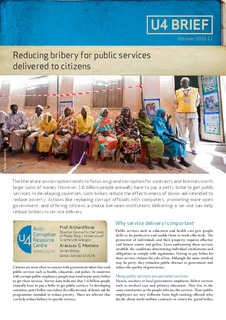Reducing bribery for public services delivered to citizens
Report
Permanent lenke
http://hdl.handle.net/11250/2475140Utgivelsesdato
2015-11-01Metadata
Vis full innførselSamlinger
- Publications [1488]
Originalversjon
Bergen: Chr. Michelsen Institute (U4 Brief 2015:11) 6 pSammendrag
The literature on corruption tends to focus on grand corruption for contracts and licenses worth large sums of money. However, 1.6 billion people annually have to pay a petty bribe to get public services. In developing countries, such bribes reduce the effectiveness of donor aid intended to reduce poverty. Actions like replacing corrupt officials with computers, promoting more open government, and offering citizens a choice between institutions delivering a service can help reduce bribery in service delivery. Citizens are most often in contact with government when they seek public services such as health, education, and police. In countries with corrupt public employees, people may need to pay petty bribes to get these services. Survey data indicates that 1.6 billion people annually have to pay a bribe to get public services. In developing countries, petty bribes can reduce the effectiveness of donor aid for programmes intended to reduce poverty. There are reforms that can help reduce bribery in specific services.
Serie
U4 Brief 2015:11U4 Brief 2015:11
